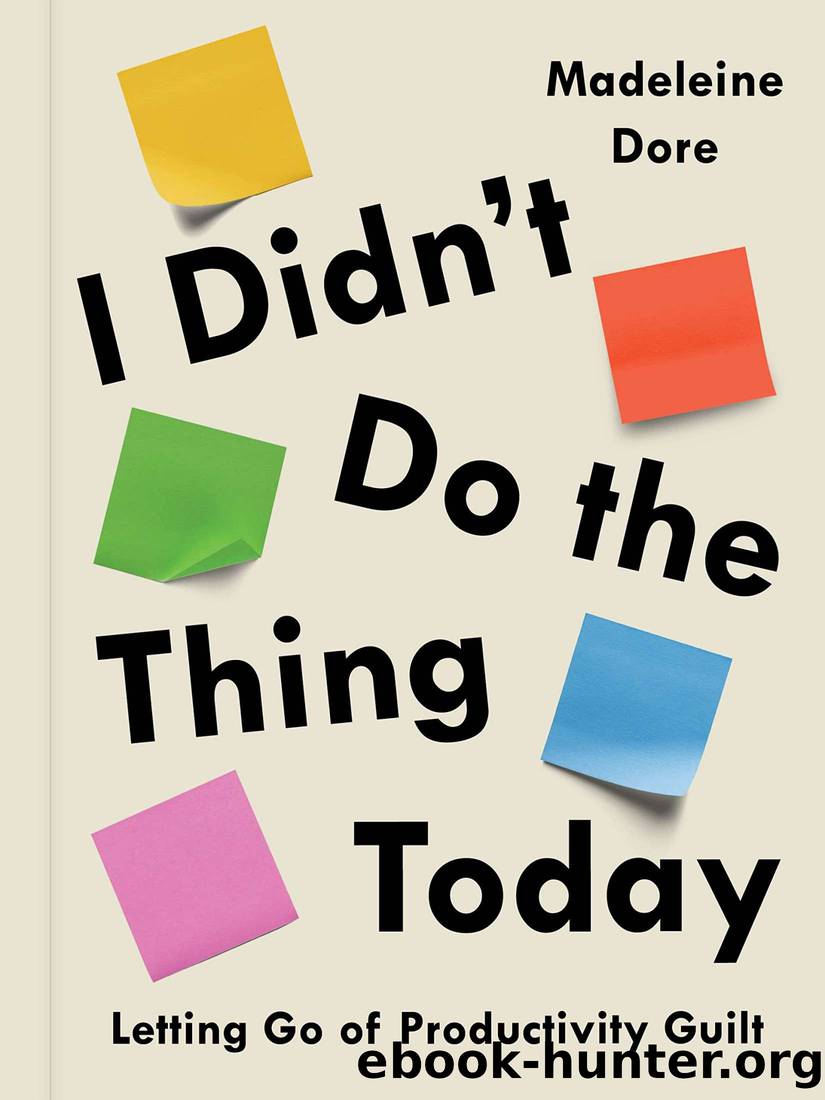I Didn't Do the Thing Today: Letting Go of Productivity Guilt by Madeleine Dore

Author:Madeleine Dore
Language: eng
Format: azw3
Tags: Self Help, Psychology, Adult, Health
ISBN: 9780593419144
Publisher: Avery
Published: 2022-01-11T08:00:00+00:00
Taking an Inventory of Our Shoulds
Rather than dismissing the days that didnât meet our expectations, perhaps itâs the unrealistic shoulds and the onerous obligations that we need to strike.
Shoulds accumulate from many sources, but itâs our self-imposed shoulds that may be the easiest to spotâfor me, anyway, they are front and center on my to-do lists. In How Do We Know Weâre Doing It Right? journalist Pandora Sykes writes, âWhen I moan about how busy I am, what I actually mean is that I have a lot that I should be doing.â Our lists of shoulds are of our own makingâand so is our subsequent misery.
External expectations can be harder to trace. We may have internalized the notion that we should expect more from ourselves in school, in our careers, in our personal lives, in our relationshipsâand built our identities around such expectations. In the last three generations, according to psychoanalyst Esther Perel, much of Westernized culture has shifted into an âidentity economy,â bringing with it more personal freedom but also struggles with uncertainty, loneliness, and self-doubt. Weâve turned to work as more than a means to an end; itâs where we expect our emotional, physical, and psychological needs to be met. As Perel puts it, âWork is no longer just what you do, but who you are.â
When we conflate who we are with what we do, itâs perhaps no wonder we crowd numerous shoulds onto our to-do listsâit helps us feel tethered to something. But if to tether is to restrict, do we really want to restrict ourselves and narrow who we are? When we tie who we are to what we do, we can get stuck in an âif onlyâ spiralâwe might say we are a runner, for example, but then shame ourselves when we donât manage to run every day. We make the mistake of labeling ourselves as nouns, when we are really verbsâwe are not a runner, but rather a person who runs; weâre not a writer, but a person who writes. Our sense of self doesnât have to be bundled up with whether we did the thing todayâbecause we are not the things we do.
Perhaps being okay with being untethered from what we did or did not do is a better way to live with the ambiguities of life. In leaving ourselves undefined, we have the space to become anythingâor at the very least to be flexible and adaptive to the changes weâll encounter.
To untether ourselves from our shoulds, we may first need to recognize them. Naturally, we canât simply drop everything we donât want to do at any given moment. The lines between a should and a responsibility may become confused, but thereâs a distinct difference between the two. A should is an expectation placed on us by ourselves or by others; when inspected, it might seem flat, expired, empty, or heavy. A responsibility, however, might not be something we wish to doâit might be uncomfortable, or boring, or difficult, but is essential, or something we canât avoid without letting others down.
Download
This site does not store any files on its server. We only index and link to content provided by other sites. Please contact the content providers to delete copyright contents if any and email us, we'll remove relevant links or contents immediately.
The Four Agreements by Don Miguel Ruiz(5519)
Flow by Mihaly Csikszentmihalyi(4058)
You Do You by Sarah Knight(4029)
The Four Tendencies by Gretchen Rubin(4028)
Adulting by Kelly Williams Brown(3678)
The Hacking of the American Mind by Robert H. Lustig(3585)
A Simplified Life by Emily Ley(3576)
Right Here, Right Now by Georgia Beers(3502)
The Power of Positive Thinking by Norman Vincent Peale(3459)
The Art of Happiness by The Dalai Lama(3389)
Ikigai by Héctor García & Francesc Miralles(3148)
The Little Book of Hygge by Meik Wiking(3085)
The French Women Don't Get Fat Cookbook by Mireille Guiliano(2984)
The Heroin Diaries by Nikki Sixx(2938)
The Choice by Edith Eva Eger(2900)
Why Buddhism is True by Robert Wright(2829)
The Courage to Be Disliked by Ichiro Kishimi & Fumitake Koga(2804)
Spark Joy by Marie Kondo(2685)
Make Your Bed by William H. Mcraven(2682)
